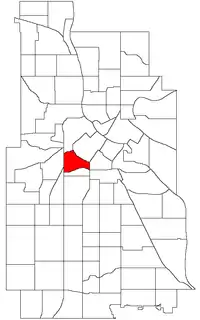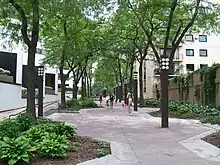Loring Park | |
|---|---|
 Location of the Loring Park neighborhood within the U.S. city of Minneapolis | |
| Coordinates: 44°58′12″N 93°17′02″W / 44.97000°N 93.28389°W | |
| Country | United States |
| State | Minnesota |
| County | Hennepin |
| City | Minneapolis |
| Community | Central |
| Area | |
| • Total | 0.452 sq mi (1.17 km2) |
| • Land | 0.452 sq mi (1.17 km2) |
| Population (2020)[2] | |
| • Total | 9,718 |
| • Density | 22,000/sq mi (8,300/km2) |
| Time zone | UTC-6 (CST) |
| • Summer (DST) | UTC-5 (CDT) |
| ZIP code | 55403, 55404 |
| Area code | 612 |
| Census | Pop. | Note | %± |
|---|---|---|---|
| 1980 | 5,908 | — | |
| 1990 | 6,586 | 11.5% | |
| 2000 | 7,501 | 13.9% | |
| 2010 | 7,873 | 5.0% | |
| 2020 | 9,718 | 23.4% |
Loring Park is a neighborhood in the Central Community of Minneapolis, Minnesota. Located on the southwest corner of downtown Minneapolis, it also lends its name to Loring Park, the largest park in the neighborhood. The official boundaries of the neighborhood are Lyndale Avenue to the west, Interstate 394 to the north, 12th Street to the northeast, Highway 65 to the east, and Interstate 94 to the south.
Neighborhood characteristics
Loring Park is locally known for its diverse social environment and as a nexus for many arts and cultural events, boasting over 300 businesses and institutions. Loring Park hosts the annual LGBTQ pride fest and is the end location of the pride parade. The Loring Park District, according to its official site, offers the "quintessential urban lifestyle," a blend of "condominium and apartment living." The philosophy of the district is one of coalescence: it seeks to mix the old with the new, desiring to become quaint and charming through its combining of the modern with the "historic brownstone."[3]
Notable buildings in Loring Park include 430 Oak Grove (Northwestern National Life Insurance Company Home Office), Basilica of St. Mary, St. Mark's Episcopal Cathedral, Minneapolis Community and Technical College, and the Minneapolis Convention Center. The Loring Greenway connects Nicollet Mall with Loring Park. The park is surrounded by apartment buildings, many dating from the early 1900s, although recent construction in the area has brought many new town homes and condominiums to the area. In 1972, the Loring Park Development District was created to use tax increment financing to demolish older apartment buildings in an approximately 10-block area and build new higher density buildings and commercial development, such as the Hyatt hotel on Nicollet. The Loring Greenway was created as part of this district.[4] The neighborhood includes part of the Harmon Place Historic District.[5]
Demographics
In the 2020 Census, 9,718 people lived in the Loring Park neighborhood.[6] According to the 5-year American Community Survey (ACS) data for 2017-2021, 72% of residents were white, 10.9% were Black, 4.7% Asian, 4.6% two or more races, and 5.3% Hispanic or Latino.[7] The neighborhood is majority renters. In the 2017-2021 ACS data, 68.6% of housing units were occupied by renters and 19.6% by owners. The average household size was 1.3 for both owners and renters.[8]
Gallery
.jpg.webp) Downtown Minneapolis from Loring Park
Downtown Minneapolis from Loring Park MCTC Technical Building
MCTC Technical Building Loring Greenway - panoramio
Loring Greenway - panoramio.jpg.webp) Loring Park (25650475142)
Loring Park (25650475142) Loring Alley, Loring Park, Minneapolis, MN
Loring Alley, Loring Park, Minneapolis, MN Loring Park Aerial
Loring Park Aerial
| Racial composition | 2020[9] |
|---|---|
| White (non-Hispanic) | 72.6% |
| Black or African American (non-Hispanic) | 9.9% |
| Hispanic or Latino | 5.0% |
| Asian (non-Hispanic) | 5.3% |
| Other race (non-Hispanic) | n/a |
| Two or more races (non-Hispanic) | 3.7% |
References
- ↑ "Loring Park neighborhood in Minneapolis, Minnesota (MN), 55403, 55404 detailed profile". City-Data. 2011. Retrieved 2013-11-12.
- ↑ "Loring Park neighborhood data". Minnesota Compass. Retrieved 2023-02-19.
- ↑ "Home | Loring Park District - Downtown Minneapolis". Loring Park District. Retrieved 2016-03-08.
- ↑ "Loring Park: Loring Greenway and Housing Historical Marker". www.hmdb.org. Retrieved 2023-11-20.
- ↑ Minneapolis, City of. "Harmon Place Historic District". www2.minneapolismn.gov. Retrieved 2023-11-20.
- ↑ "Loring Park | MN Compass". Minnesota Compass. Retrieved 2023-11-20.
- ↑ "Loring Park | MN Compass". Minnesota Compass. Retrieved 2023-11-20.
- ↑ "Loring Park | MN Compass". Minnesota Compass. Retrieved 2023-11-20.
- ↑ "Loring Park | MN Compass".